

Story Idea Machine. The Marshall Plan® Story Idea Machine In just five easy steps, the Story Idea Machine helps you create the basis of a solid novel—quickly and easily, again and again.
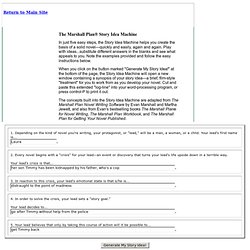
Play with ideas...substitute different answers in the blanks and see what appeals to you. Note the examples provided and follow the easy instructions below. When you click on the button marked "Generate My Story Idea! " at the bottom of the page, the Story Idea Machine will open a new window containing a synopsis of your story idea—a brief, film-style "treatment" for you to work from as you develop your novel. The concepts built into the Story Idea Machine are adapted from The Marshall Plan Novel Writing Software by Evan Marshall and Martha Jewett, and also from Evan's bestselling books The Marshall Plan® for Novel Writing, The Marshall Plan Workbook, and The Marshall Plan for Getting Your Novel Published.
Random name generator. Main/Stock Characters. Four Temperament Ensemble. Clockwise from top left: Phlegmatic, Sanguine, Choleric, and Melancholic.
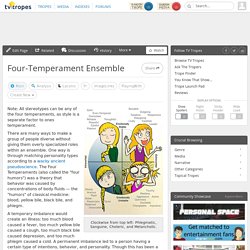
Note: All stereotypes can be any of the four temperaments, as style is a separate factor to ones temperament. There are many ways to make a group of people diverse without giving them overly specialized roles within an ensemble. One way is through matching personality types according to a wacky ancient pseudoscience. The Four Temperaments (also called the "four humors") was a theory that behavior was caused by concentrations of body fluids — the "humors" of classical medicine: blood, yellow bile, black bile, and phlegm. A temporary imbalance would create an illness: too much blood caused a fever, too much yellow bile caused a cough, too much black bile caused depression, and too much phlegm caused a cold.
(older version with blends here ), and The Other Wiki offers its information here . Open/close all folders Fan Fiction The four main anthropomorphic animal characters in the Sonic X fanfic Don't Keep Your Distance. Animal Symbolism. FIVE MISTAKES A BEGINNING WRITER SHOULD AVOID (and will probably fall prey to) We asked David S.
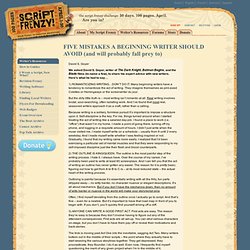
Goyer, writer of The Dark Knight, Batman Begins, and the Blade films (to name a few), to share his expert advice with new writers. Here's what he had to say… 1) ROMANTICIZING WRITING…DON’T DO IT. Many beginning writers have a tendency to romanticize the act of writing. They imagine themselves as pint-sized Colettes or Hemingways or the screenwriter du jour. But the dirty little truth is – most writing isn’t romantic at all. Because writing is a solitary, formless pursuit it’s important to impose a structure upon it. 2) THE OUTLINE IS KING/QUEEN. Outlining is painful because it’s essentially writing with all the frilly, fun parts stripped away – no witty banter, no character nuance or elegant descriptions. Often, I find myself deviating from the outline once I actually go to script. 3) ANYONE CAN WRITE A GOOD FIRST ACT. 5 SECRETS FOR IMPROVING YOUR COMEDY WRITING. With Sitcom Writer/Producer Fred Rubin Whether you’re writing a rom-com, a fantasy, or a horror flick, nearly every script can benefit from more levity.
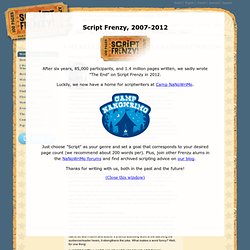
So we asked Fred Rubin, veteran writer/producer of such TV classics as “Different Strokes," “Mama’s Family," “Family Matters,” and “Night Court,” to share his side-splitting secrets. Besides writing dozens of sitcom episodes, pilots, and TV movies, Fred teaches at the UCLA film school and spends a great deal of time punching up scripts for other writers. Take it away, Fred! Learning to be funny is one of the most difficult writing skills to master. Whenever I’m hired to do a script punch up, before getting deeply into rewriting jokes or going through the time consuming task of writing new jokes, I always do a quick reading of the script with the following five tips in mind. 1) BE SPECIFIC There is nothing that improves a joke more than using a “specific” allusion. 2012.scriptfrenzy. Television needs more good writers.
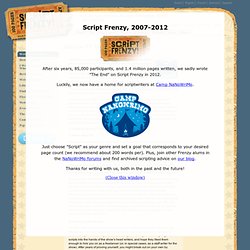
Somebody’s gotta tell the little people that live in that box what to say and when to say it, and that, my friends, is where you come in! There’s not a person writing television today who didn’t start off sitting alone at their desk, wondering who the heck they were trying to fool. What makes them special is that they started. They slogged through it. And they finished. If you’ve never written a TV script before, fear not—as you move through the pointers below, you’ll probably realize that most of them are already second nature. 11 Steps to Serious TV Writing Mastery 1) Watch More TV Before getting started, you might want to grab yourself a notebook and couple of pens.
As you watch, write down interesting plot points or dialogue that seems especially funny or effective. Ten years ago, if you wanted to be a TV scribe, there was just one way to break into the ‘biz. That was then. 3) Know Your Show 4) Know Your Audience.